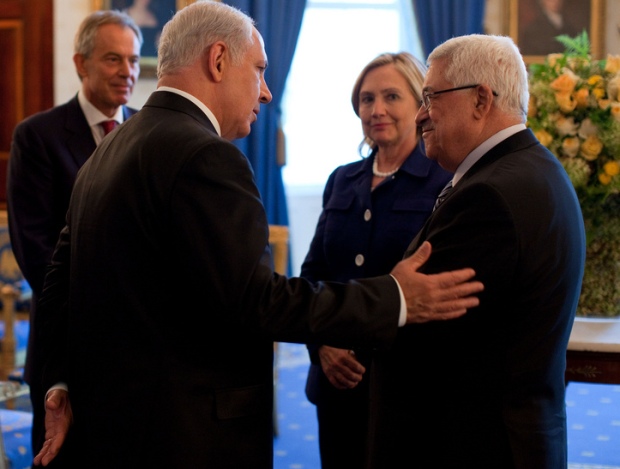The unequal dynamic in the negotiating room guarantees that neither peace nor justice will come out of direct talks between Israelis and Palestinians
Palestinian Authority President Mahmoud Abbas said this week that without a complete settlement freeze, talks with Israel will not resume. In response, Prime Minister Benjamin Netanyahu declared that “Abbas has turned his back on peace with Israel.” Both statements, it seemed, were directed at international listeners, those who still repeat every now and then the mantra that “direct negotiations are the key to resolution of the conflict.”
In fact, right now, direct negotiations are the exact recipe for prolonging the occupation.
There is a strange misconception that have accompanied negotiations – or lack thereof – between Israelis and Palestinians in the last two decades. It has to do with “the goods” the two sides are expected to exchange in a peace agreement: the Israelis, we are told, will hand the Palestinians land, in exchange for national security guarantees. This is the framework that has accompanied all previous rounds of talks, and failure or success were judged in accordance.
Yet security is the one thing Palestinians cannot give Israel. Israel’s security will be placed at risk by evacuating the West Bank, and nothing the Palestinians say or do can eliminate this risk (one could also argue that Israel’s security would be at risk by continuing the occupation, but this is a separate debate). Any kind of agreement President Abbas signs today won’t guarantee that in five, ten or twenty years, hostilities won’t be renewed. “Peace,” or mutual security, depends on political circumstances and how both leaderships conduct themselves in years to come – not on documents they sign now.
In fact, one can conclude – especially given the outcome of Israel’s 2005 pullout from Gaza, the legacy of a century-old conflict, the economical inequality and the existence of groups that are likely to oppose any agreement – that some form military escalation is a likely scenario at some point in the future. So any promise the Palestinians or Israel make today is worthless on its own, since we cannot anticipate political developments in both societies. The security-oriented debate regarding the withdrawal from the West Bank is mostly a façade or a pretext used to avoid concessions, since no absolute security guarantees can be given to Israel by a second or even third party.
But the Palestinians can give Israel something it needs, and this is legitimacy – legitimacy in the eyes of the international community, and legitimacy in the eyes of most of the Arab world. That is what Israel lacks, and that’s what it was offered in the 2002 Arab League peace initiative: full legitimacy in exchange for a full withdrawal from the land conquered in 1967. Back then Israel declined this offer, so (some) Palestinians have kept hitting it where it hurts, by questioning Israel’s legitimacy in controlling the West Bank or even its right to exist.
This exchange, legitimacy for land, is the real one which dominated negotiations and shaped their dynamic. But there is a fundamental imbalance to this exchange: While Palestinians only receive their “goods” after the negotiations end – if they get them at all – Israeli leaders are paid with legitimacy from the minute they enter the negotiation room.
This is the reason that the Israeli right, which until the early 1990s opposed all contacts with PLO leaders and demanded those holding talks with the organization put on trial, is now courting the Palestinian leadership, asking to negotiate “anytime,” “anywhere,” and “without pre-conditions.” This, as Netanyahu, Defense Minister Ehud Barak and Foreign Minister Avigdor Lieberman understood, is the most effective way to enjoy national consensus and fight off diplomatic pressure. From the perspective of any Israeli prime minister, and certainly a right-wing one, it is very tempting to stay in the negotiating room forever – postponing indefinitely the near-civil-war that will accompany the evacuation of settlements, while earning the international legitimacy of “the peacemaker.”
This is the exact policy Prime Minister Netanyahu is persuing. Netanyahu is even ready to pay some political currency – remember the partial freeze of 2010 – in order to get Mahmoud Abbas into the negotiating room with him. The American and European effort to get the Palestinian leadership to negotiate, done usually through a combinations of threats and bribes, is the evidence that despite all the angry rhetoric from both sides, Western diplomacy is still pretty much in sync with the main policy objective of the Jerusalem government – namely, to tighten its control over the territories without assuming responsibility for their Palestinian population.
There was an interesting article by centrist pundit Ari Shavit on Haaretz a few days ago. Shavit, who supported Defense Minister Barak in the last elections, claimed that “the old peace is dead,” and called for it to be replaced with a new “peace” vision:
[T]he death of the old peace requires some creative thinking about a new peace…
This new peace won’t be the peace of our dreams. It won’t be the peace that puts an end to the conflict. It will not even be a peace that ends the occupation.
But perhaps this new, modest peace will enable us to forge a path through the storm, to manage the Israeli-Palestinian conflict and somewhat abate it. This new peace could provide Israel’s center and left with a new, relevant diplomatic agenda. Now that the old peace is dead, we must quickly replace it with a new, realistic peace.
It is worth reading the entire article. While the “factual” account with which Shavit opens was destroyed by Akiva Eldar here, the “new policy” Shavit is calling for is already implemented by the Israeli government(s), which long ago replaced the peace process – not with “a new peace,” but simply with “the process.”
Under such circumstances, a Palestinian refusal to negotiate is not only understandable, but even desirable.
——————–
In my next policy post: What makes the occupation the Israeli rational choice


